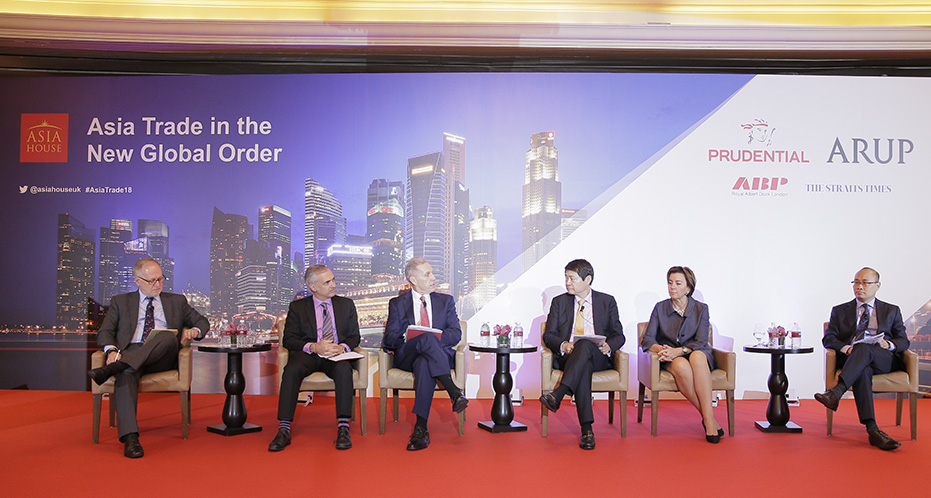Driving commercial and political engagement between Asia, the Middle East and Europe
Driving commercial and political engagement between Asia, the Middle East and Europe
Driving commercial and political engagement between Asia, the Middle East and Europe

Asia House’s major trade dialogue in Singapore, Asia Trade in the New Global Order, saw trade tensions come under focus. Watch ‘The Shifting Trade Landscape in Asia and Beyond’ panel session below.
There is a “growing momentum” towards reform within the World Trade Organization (WTO) as the multilateral system comes under increasing pressure, delegates at Asia House’s trade conference in Singapore were told.
But it’s not just the WTO that needs reform – China must also change its economic practices if trade tensions with the US are to ease, the conference heard.
In an engaging discussion on the ‘Shifting Trade Landscape in Asia and Beyond,’ leading commentators explored the challenges facing world trade today, and what needs to happen to overcome them.
One source of friction is the role of the WTO, which has come under attack from the US over its perceived failure to enforce rules in relation to China’s trade practices.
According to Robert Koopman, Chief Economist at the WTO, there is “definitely” an appetite for reform among members.
“There is a growing momentum to have a deep discussion about reform,” he said, highlighting areas of focus including “transparency… the notifications for subsidies, and how quickly disputes are handled.”
“The WTO is a more flexible organisation than many people think,” he added.
However, the speed at which meaningful reforms can happen to appease critics of the WTO will be a key factor shaping the future trade landscape. The US is running out of patience, particularly on China’s policy of using state subsidies to propel economic growth, Steven Okun, Senior Advisor at McLarty Associates, suggested.
“The US has recognised that our consensus for the past 25 years of accommodating and engaging China on trade and economics is over.”
He argued that relations will not improve until the fundamental question of China’s economy is addressed.
“Until there’s a discussion on how China’s going to transform form a state-led economy to a market driven economy, and how the US and the West are going to be part of that discussion, I don’t see any change happening.”
Offering a European perspective, Anne Ruth Herkes, former State Secretary, German Federal Ministry for Economic Affair and Energy, noted a hardening of views within the EU towards China.
“We have, and certainly my country has, changed its attitude towards China trading and investing in Germany to the degree that we are more cautious,” she said. “China hasn’t given way in terms of how it prevents a level playing field to come into existence, and it has not given way in terms of intellectual property issues.”
But she questioned the wisdom of current US policy on China.
“Going for full blown-out trade friction in a world that is as interdependent as ours is not a smart move.”
Watch the full discussion below
The emerging consensus on the panel, then, was that China needs to change. But will Beijing give ground? That was a question Michael Lawrence, Chief Executive of Asia House and panel moderator, put to Dr Wang Huiyao, Founder and President of the Center for China and Globalization.
“China is trying to make a lot of progress,” Dr Wang said, adding that it has already opened up to the benefit of Western businesses.
“Companies, particularly from the US, have made enormous inroads in China. Every year they make US$500 billion revenues in China. The trade deficit is only US$37 billion.”
Dr Wang emphasised the need for dialogue as opposed to acrimonious measures, and called for the US and China to consider joining the Comprehensive and Progressive Agreement on Trans Pacific Partnership (CPTPP) in particular.
“Tariffs are not the way to go. Let’s do the multilateral talks, let’s do the WTO reforms, let’s do the CPTPP,” he said. “Let’s work together.”
The CPTPP does appear to be taking on greater significance as the multilateral system falters. Luong Huong Thai, Director General of the Multilateral Trade Policy Department, Ministry of Commerce of Vietnam, is involved in CPTPP negotiations, and acknowledged that current tensions are influencing CPTPP discussions.
“The CPTPP is something that we are trying to do a little bit quicker because of what is happening,” he said. But he cautioned against expectations of an imminent resolution.
“Many people hope we can finish a trade agreement in a few months. But to be practical, most serious trade negotiations take years, not months,” he said.
It was the need for reform, then, that emerged as the key consensus during what was a lively panel discussion. Without it, the multilateral system may not survive. Okun, drawing on China’s tech ambitions, made that point forcefully.
“There’s no way that Made in China 2025, with its state subsidies, should be compliant under the WTO,” he said, adding: “If the WTO can’t reform, the US is going to go and do it on its own.”
Watch the discussion in full
